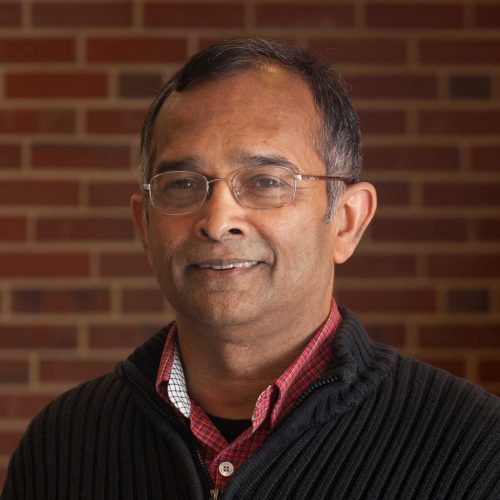Ranji Ranjithan
Civil, Construction, and Environmental Engineering
- Phone: 919-515-6979
- Email: ranji@ncsu.edu
- Office: Fitts-Woolard Hall 3311B
- Website: https://www.engr.ncsu.edu/people/ranji/
Dr. S. Ranji Ranjithan is a Professor of Civil Engineering. He joined the Civil Engineering Department at North Carolina State University in 1995. He is also a faculty member in the Operations Research Program. His research interests are in the area of engineering systems analysis. Dr. Ranjithan is a member of the Environmental, Water Resources, and Coastal Engineering and Computing and Systems faculty groups within Civil Engineering. His primary areas of teaching and research focus on developing mathematical and computer-based procedures for modeling and analysis of engineering systems, and their implementations to aid decision-makers to explore and examine solutions to complex engineering problems.
Current and recent areas of application include infrastructure systems engineering, water and environmental sustainability, solid waste management, groundwater monitoring and remediation, watershed management, non-destructive testing of pavements and timber structures, and emergency evacuation management. Working in collaboration with fellow researchers, he focuses on approaching these problems from a multi-disciplinary perspective. Most of his applications research attempt to integrate systems analytic methods with different computational paradigms to develop working prototypes of engineering decision support tools.
His research sponsors and collaborating agencies include the US EPA, NSF, DHS, Center for Transportation and the Environment, North Carolina Supercomputing Center/MCNC, Oak Ridge National Laboratories, North Carolina Department of Environment and Natural Resources, Research Triangle Institute, North Carolina Department of Transportation, and Transportation Research Board.
Research Description
Dr. Ranjithan is interested in mathematical modeling and optimization, evolutionary computation, systems analysis, computer-based decision support tools, decision making under uncertainty, and artificial neural networks; areas of applications including air quality management, watershed management, animal waste management, solid waste management, and transportation engineering. He is involved with Computing and Systems, Energy, and Architectural research that is helping to innovate sustainable building design by coupling simulation and building information models with analytical and optimization methods to integrate architectural and engineering design processes such that the energy efficiency of buildings can be enhanced at every stage of building design. Mathematical modeling and computational procedures are being developed and used by his group of Computing and Systems researchers to quantify the resilience of a civil infrastructure system (CIS) in supporting lifeline services that are collectively enabled by the components of that CIS. Founded on these research results, the system-wide resilience metrics are combined with decision models and search algorithms to prioritize infrastructure investments to improve lifeline service resilience considering storm hazards and their impacts on the civil infrastructure systems. His Computing and Systems and Water Resources research collaborations are playing a key role in helping to detect leaks in water distribution networks by integrating hydraulic simulation models and infrastructure data with contemporary analytical methods that are enabled by high-performance computing technologies. Computational and analytical procedures in sync with modern search algorithms developed by his research team have resulted in efficient and effective decision-support tools to identify sources of contamination in groundwater aquifer systems and water distribution networks. Through development and innovative interfacing of data, measurements, analytical and decision models, and search algorithms for optimization, he couples Computing and Systems and Environmental Engineering research to develop, test and apply one-of-a-kind life-cycle-based municipal solid waste management decision-support tool for generating integrated waste management plans that consider cost, energy and material consumption, environmental impacts and potential carbon prices. Through his collaborative efforts in Computing and Systems and Water Resources Research, flow alteration-driven ecological impacts in watersheds due to land-use and climate change effects are being modeled and studied through the development of contemporary data and modeling tools and their integration with optimization methods that support water sustainability and adaptive watershed management.
Education
| Degree | Program | School | Year |
|---|---|---|---|
| Ph.D. | Doctor of Philosophy in Environmental Engineering | University of Illinois, Urbana-Champaign | 1992 |
| MSIEM | Master of Science in Industrial Engineering and Management | Asian Institute of Technology | 1985 |
| BSME | Bachelor of Science in Mechanical Engineering | University of Peradeniya | 1981 |

